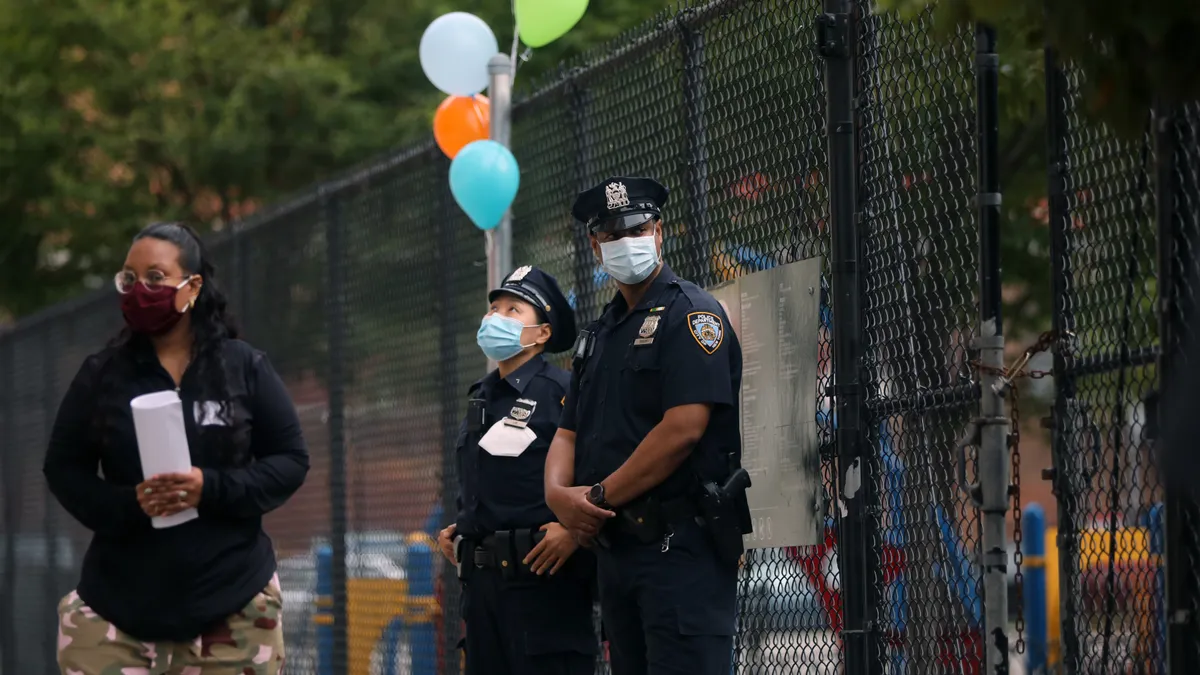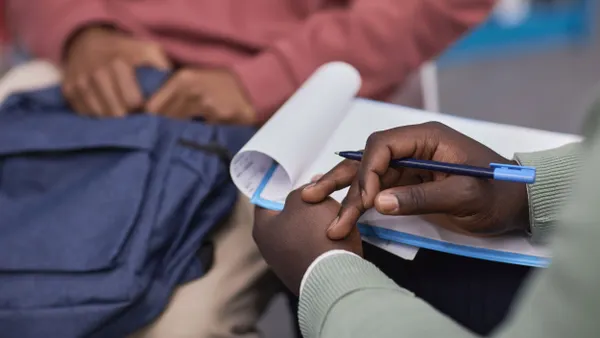Dive Brief:
- Amid conflicts over schools' COVID-19 safety measures — including masks, quarantines and vaccines — the National Association of Secondary School Principals on Thursday issued a call for federal support for school leaders facing threats over practices in line with pandemic safety guidelines.
- A press release from the organization cited school leaders' interactions with hostile community members and threats to their safety and that of their schools, specifically citing the experience of Principal Teresa M. Hill of Walden Grove High School in Arizona.
- “One month ago, seven people refused to leave our campus demanding a quarantined student attend class. After a lockdown of the front office for three hours, we were forced to arrest three of them," Hill said in the release. "This has resulted in multiple threatening and intimidating voice messages, emails, and social media comments directly targeting me. Calling me a Nazi, a fascist, using profanity, and being told to ‘eat the end of a shotgun’ is beyond disturbing."
Dive Insight:
Pandemic safety measures, critical race theory and transgender students' rights are among a variety of highly charged topics that have fueled polarization and divisiveness in increasingly contentious school-community relationships in the past year.
“We need the full authority of the federal government to help us remove or ban threatening individuals from our schools who are determined to do nothing more than disrupt learning or potentially harm us or our staff," NASSP CEO Ronn Nozoe said in the organization's release. "At the very least, we need the U.S. Department of Education to issue specific guidance on the authority school leaders have to protect themselves and our ability to remove or ban hostile parents and individuals from school grounds who threaten our safety."
At the school level, educators have faced both physical and verbal threats. In many locations, school board meetings have also been among the most prominent locations for these tensions to escalate.
In a June 22 meeting of the Loudoun County School Board in Virginia, for example, a public comment section in which 259 people signed up to speak was cut short due to the shouting of attendees. After again being disrupted by shouting when the board attempted to move on, the meeting broke for recess. It eventually became a closed session.
According to news reports, one person was also charged with disorderly conduct.
After an August school board meeting in Williamson County, Tennessee, police had to escort supporters of school masking policies, including doctors and nurses, to their cars amid threats from anti-mask attendees. And in Rutherford County, Tennessee, a video of a pro-mask student being heckled by attendees while speaking about his late grandmother during a September school board meeting recently went viral.
Experts have suggested despite these concerns that heated discourse shouldn't deter boards from conducting open meetings, but that clear guardrails for maintaining decorum should be set upfront.
Among suggestions are time limits for public comments with a visual clock counts down remaining time to speak, deadlines for speaker signups, the option to reconvene in larger spaces if a crowd is bigger than anticipated, and the expectation that the board may vote to go into recess if emotions escalate or the audience becomes too unruly. Speaker's privileges also may be revoked if they violate decorum by using vulgarity or profanity, reveal personality identifiable student information, or break other public comment rules set out in policy.
During a webinar hosted jointly this week by the Harvard T.H. Chan School of Public Health and Harvard Graduate School of Education, panelists suggested communities must heal these fractures by recognizing the importance of schools in students' holistic development, the strain schools are under due to the pandemic in addressing both trauma and academic needs, and the importance of making personal connections to address concerns while remembering that everyone ultimately wants student safety to be the priority.













